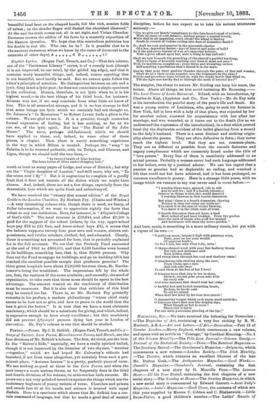English Lyrics. (Kegan Paul, Trench, and Co.)—That this volume, one
of the "Parchment Library" series, is of a comely look (though it is not improved, to our mind, by the gilded top-edge), and that it contains many beautiful things, and, indeed, scarce anything that is not beautiful, need hardly be said. But we cannot quite follow the editor's principle of selection. He distinguishes between an ode and a lyric. Gray is not a lyric poet; he does not contribute a single specimen to the collection. Horace, therefore, is not lyric when ho is in his highest mood,—in the best things of his third book, for instance. Alcaeus was not, if we may conclude from what little we know of him. This is all somewhat strange, and it is no less strange to find that some things are lyric which we certainly had not thought so, Dr. Johnson's " In Memoriam " to Robert Levett finds a place in the volume. We are glad to see it. It is a genuine, though somewhat formal expression of feeling, but it has nothing, so far as we can see, of the lyric spirit. Nor has "The Burial of Sir John Moore." The term, perhaps old-fashioned, which we should have applied to these, and, indeed, to some other of these pieces, is elegiac. Then there is surely something capricious in the way in which Milton is treated. Perhaps the " song " to Sabrina is to be counted pedantic, with its Tethys, and Glaucus, and Ligea, though we should hold the two lines,-
" In twisted braids of lilies knitting The loose trains of thine amber-dropping hair,"
worth at least as many pages of Lodge, and even of Herrick ; but why not the " Virgin daughter of Locrine," and still more, why not, " To the ocean now I fly" ? But it is ungracious to complain of a goodly feast that it does not contain all the dishes which we might have chosen. And, indeed, there are not a few things, especially from the dramatists, here which are quite fresh and unhackneyed.


































 Previous page
Previous page